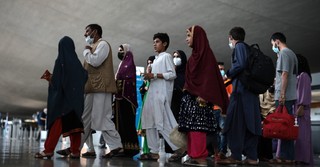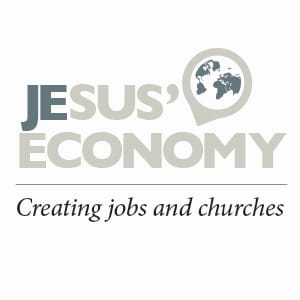Refugees of the Bible and What it Means to be Christian
Share

by John D. Barry, CEO of Jesus' Economy
Fear drives many decisions. It leads us to make harsh decisions, based on stereotypes of whole people groups. Historically and of recent, fear has led people to bend the Bible to fit their own viewpoints.
At the core of the biblical text is a call to salvation, compassion, and equality. To characterize it any other way is to miss the entire point of the Scriptures we hold so dear and defend.
I have recently written on how Christians should respond to refugees and immigrants. Since that time, the comments I have received have made me realize that further clarity is needed.
The Bible is full of stories of refugees and immigrants. There are countless passages in defense of the helpless, weak, and marginalized; as well as many passages about how to treat an outsider.
OLD TESTAMENT REFUGEES AND IMMIGRANTS
Abraham the patriarch, was a refugee:
“And there was a famine in the land. And Abram went down to Egypt to dwell as an alien there, for the famine was severe in the land” (Genesis 12:10 LEB).
But Abraham is not the only one who is a refugee in the Old Testament. Abraham and his wife Sarah cause Hagar, Sarah’s servant and the mother of Ishmal, to become a refugee, when Sarah exiled Hagar out of anger (Genesis 16). Those once in need create injustice—as so often is the case with power.
Later in Genesis, ten of Abraham’s great-grandsons go to Egypt as refugees during a famine:
“When Jacob realized that there was grain in Egypt, Jacob said to his sons, ‘Why do you look at one another?’ Then he said, ‘Look, I have heard that there is grain in Egypt. Go down there and buy grain for us there that we may live and not die’” (Genesis 42:1–2 LEB).
This moment leads to Jacob (Abraham’s grandson), and his entire family, moving to Egypt as immigrants. They are accepted into Egypt by Pharaoh himself (see Genesis 46:26–27; 47:1–12).
The Hebrew people eventually become slaves in the land of Egypt. This is the case when Moses comes on the scene. Moses himself becomes an outlaw and refugee in the land of Midian, after he murders an Egyptian who was beating a Hebrew slave (southeast of Israel; Exodus 2:11–22).
And, as we all know, Moses and his brother Aaron—by the power of Yahweh—lead the Hebrew people out of slavery in Egypt. Effectively, the entire people group become refugees with nowhere to go (Exodus 2:23–25; 15:22–27). This leads Yahweh himself to provide for them (Exodus 16). And one of the first things God does upon their rescue is to recognize that they must have laws to protect the immigrant, refugee, and powerless (Exodus 22:21–27).
Later in Israel’s history, once the Hebrew people are a nation with their own land, king David himself lives as an asylum-seeker on multiple occasions (e.g., 1 Samuel 21:10).
Trekking forward in Israel’s history, we find the prophet Elijah living as a refugee because he spoke truth to the king and was persecuted for it (1 Kings 17:3, 8–10).
And these are simply the stories of major Old Testament figures who were outcasts, asylum-seekers, immigrants, and refugees. There are also many stories of immigrants who needed protection and help—such as the mother of king David, Ruth, who was a Moabite who immigrated to Israel (see Ruth 1).
JESUS THE REFUGEE
The most famous biblical example of a refugee is Jesus himself.
“Now after [the wise men] had gone away, behold, an angel of the Lord appeared in a dream to Joseph, saying, “Get up, take the child and his mother and flee to Egypt, and stay there until I tell you. For Herod is about to seek the child to destroy him.’ So he got up and took the child and his mother during the night and went away to Egypt. And he was there until the death of Herod, in order that what was said by the Lord through the prophet would be fulfilled, saying, ‘Out of Egypt I called my son’” (Matthew 2:13–15 LEB).
After Jesus’ birth, king Herod sought to kill Jesus (Matthew 2). As a result, Jesus, Joseph, and Mary had to flee to Egypt as refugees. To clarify an error I have seen recently: Joseph, Mary, and Jesus travel to Bethlehem for Caesar’s census before going to Egypt (Luke 2:1–7). Jesus did not travel to Egypt to register for the census; he went there as a refugee (compare Matthew 1:25–2:1).
HOW JESUS JUDGED REAL CHRISTIANITY
It seems that in the midst of so much modern debate about policy and politics, we have lost sight of one vital part of the Christian message—compassion. I have even heard many people argue that we cannot judge how a real Christian should respond to the global refugee crisis.
To answer this question, we can simply look to Jesus’ own words. When speaking about his final judgment, upon his second coming, Jesus says this to those who understood and received his message:
“Inherit the kingdom prepared for you from the foundation of the world! For I was hungry and you gave me something to eat, I was thirsty and you gave me something to drink, I was a stranger and you welcomed me as a guest, I was naked and you clothed me, I was sick and you cared for me, I was in prison and you came to me.’ Then the righteous will answer him, saying, ‘Lord, when did we [do these things]?’ And the king will answer and say to them, ‘Truly I say to you, in as much as you did it to one of the least of these brothers of mine, you did it to me’” (Matthews 25:34–40 LEB).
It is in the welcoming of the stranger, helpless, marginalized, and those in need that Jesus recognizes a true Christian from one who is not (Matthew 25:31–46).
In worries about security, many people have become apathetic to the suffering of the helpless. When empathy fails us, what we hold so dear—freedom itself—will also fail. The very nature of what we call Christianity will fail.
Out of a desire to protect ourselves, we often turn a blind eye to the suffering of other people. But in the process of doing so, we’re hurting humanity. We’re hurting freedom and we’re hindering the work of the gospel.
Photo credit: ©Getty Images/Anna Moneymaker/Staff
This article is by John D. Barry, the CEO of the non-profit Jesus' Economy. By shopping fair trade at JesusEconomy.org, you can create jobs for the impoverished. You can also give directly to a cause you're passionate about, such as creating jobs, planting churches, or meeting basic needs. 100% goes to the developing world. Join the movement at JesusEconomy.org.
